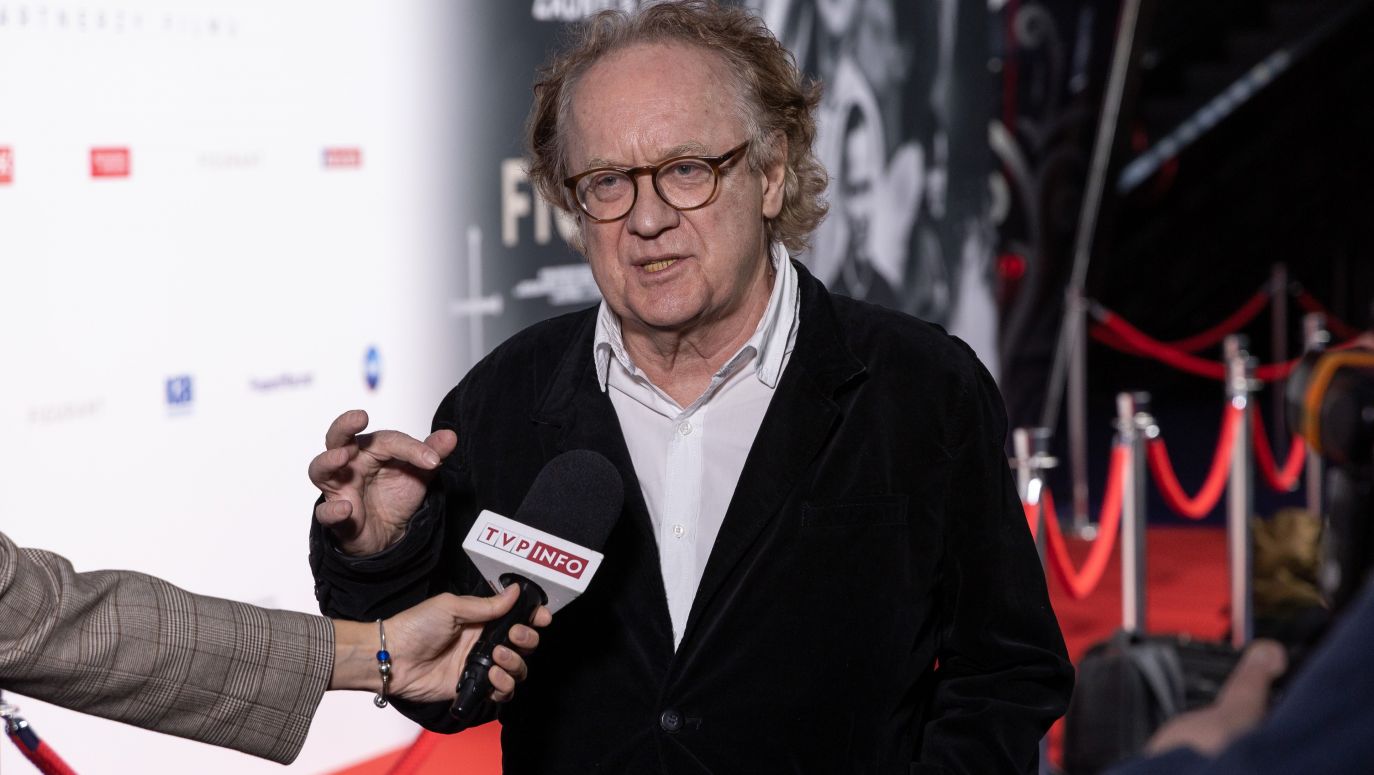TVP WEEKLY: The script for “Figurant” (“Strawman”) was written 20 years ago by Andrzej Gołda and apparently there have been several preliminary attempts to adapt this material but it was only you who managed to make the film. How did that happen, and what did you find in this script that others might not have noticed?
Robert Gliński: I was raised in communist Poland. I have a great feeling for that era. It shaped me. The Polish People’s Republic was full of secrets. Grey and hard everyday life. And a wonderful, extraordinary flowering of culture and art. Exceptional theatre performances, fascinating films, touching songs, excellent exhibitions in Zachęta. Belles-lettres really “belles”! Poetry turned me on and I mean it: Białoszewski, Herbert, Miłosz, Grochowiak, Lipska. And somewhere behind this glorious world of art lay the secret intrigues of the secret police. There was the Church where everyone would run – from the right, from the left, from the centre… The atmosphere of that time was clearly depicted in the script for “Fgurant”.
When the text reached me, I started looking for an idea of how to visualise it, how to show it on the screen. I knew I wanted to make a “Cracovian” film and set it firmly in the communist era. But I didn’t know how to do it. How to structure the narrative, what convention to choose, what image to create, how to pace the story, what music to use? There was a great deal of open questions. After a few years, when I had found answers to these questions, the producer, i.e. the Documentary and Feature Film Studios, and I began to look for financing. It also took a lot of time and wasn’t easy.
How did you make it that the world you wanted to show was authentic for the audience? Was it difficult to recreate that reality?
The concept of showing that era in the film was based on combining old archive footage with contemporary feature film footage that we shot. A kind of refrain developed, i.e. scenes constructed from old newsreels, which imperceptibly move on to the creative story. These scenes appear in the film every 10-15 minutes.
 SIGN UP TO OUR PAGE
SIGN UP TO OUR PAGE

For example – the first entry in the sequence showing the cabaret “Piwnica pod Baranami” (Cellar under the Rams). At the beginning we see a documentary shot from the cabaret’s performance in the 1960s, then we see the second shot with the spectators watching the cabaret (also an archive shot). Subsequently, the cabaret continues its performance, but that it is filmed in the present day, with a documentary cut of the audience from the 1960s. And suddenly we see a shot of the film’s protagonist sitting in the audience – this is, of course, a shot taken now. The set, costumes, light, contrast and grain of the image are the same in old archive footage as in modern material. In the end – this was my assumption – the viewer gets lost and does not know what is archival material and what is not.
You don’t shun historical topics. Let’s mention, among others, films such as “Niedzielne igraszki” (Sunday Pranks 1983), „Rośliny trujące” (Poisonous Plants 1985), „Wszystko, co najważniejsze” (All That Really Matters 1992), but also „Kamienie na szaniec” (Stones for the Rampart 2014) and the recent „Zieja” (2020). And there are also Television Theatre plays, such as “Mein Kampf” (1993) and “Maria Stuart” (1994). All these productions show that you are eager to return to the past. What is the biggest advantage of the costume? And why are many Polish directors afraid of history?
Poland’s greatest natural resource is… history. Our western and eastern neighbours have been trying for centuries and with great care to make our history rich, varied, complicated, tragic and shocking. Poland, caught between a rock and a hard place, i.e. between Germany and Russia, has had a hard life. We never became a rich country.
The poor economy is the subject of ridicule by our Western neighbours – the term “Polnische Wirtschaft” has had an ironic and mocking connotation there for years. [It literally means “Polish management” – a stereotypical, pejorative term used in Germany regarding Polish society. “Polnische Wirtschaft” is a synonym for “unimaginable disorder”, it means extreme extravagance, disregard for realities, lack of planning and good manners – M.M.]. Backward agriculture has groaned with inefficiency for centuries.

 SIGN UP TO OUR PAGE
SIGN UP TO OUR PAGE
 For example – the first entry in the sequence showing the cabaret “Piwnica pod Baranami” (Cellar under the Rams). At the beginning we see a documentary shot from the cabaret’s performance in the 1960s, then we see the second shot with the spectators watching the cabaret (also an archive shot). Subsequently, the cabaret continues its performance, but that it is filmed in the present day, with a documentary cut of the audience from the 1960s. And suddenly we see a shot of the film’s protagonist sitting in the audience – this is, of course, a shot taken now. The set, costumes, light, contrast and grain of the image are the same in old archive footage as in modern material. In the end – this was my assumption – the viewer gets lost and does not know what is archival material and what is not.
For example – the first entry in the sequence showing the cabaret “Piwnica pod Baranami” (Cellar under the Rams). At the beginning we see a documentary shot from the cabaret’s performance in the 1960s, then we see the second shot with the spectators watching the cabaret (also an archive shot). Subsequently, the cabaret continues its performance, but that it is filmed in the present day, with a documentary cut of the audience from the 1960s. And suddenly we see a shot of the film’s protagonist sitting in the audience – this is, of course, a shot taken now. The set, costumes, light, contrast and grain of the image are the same in old archive footage as in modern material. In the end – this was my assumption – the viewer gets lost and does not know what is archival material and what is not.
 VISIT OUR WEBSITE AND GIVE US A LIKE
VISIT OUR WEBSITE AND GIVE US A LIKE  I wonder about the young secret service agent’s motivation, because his task of “exposing” Wojtyła goes far beyond the normal performance of his duties. What’s more, this particular rivalry will become an obsession for him, which – as you said – will destroy his private life. However, we do not know the sources of this obsession, we do not know why Budny is so interested in Wojtyła?
I wonder about the young secret service agent’s motivation, because his task of “exposing” Wojtyła goes far beyond the normal performance of his duties. What’s more, this particular rivalry will become an obsession for him, which – as you said – will destroy his private life. However, we do not know the sources of this obsession, we do not know why Budny is so interested in Wojtyła?



